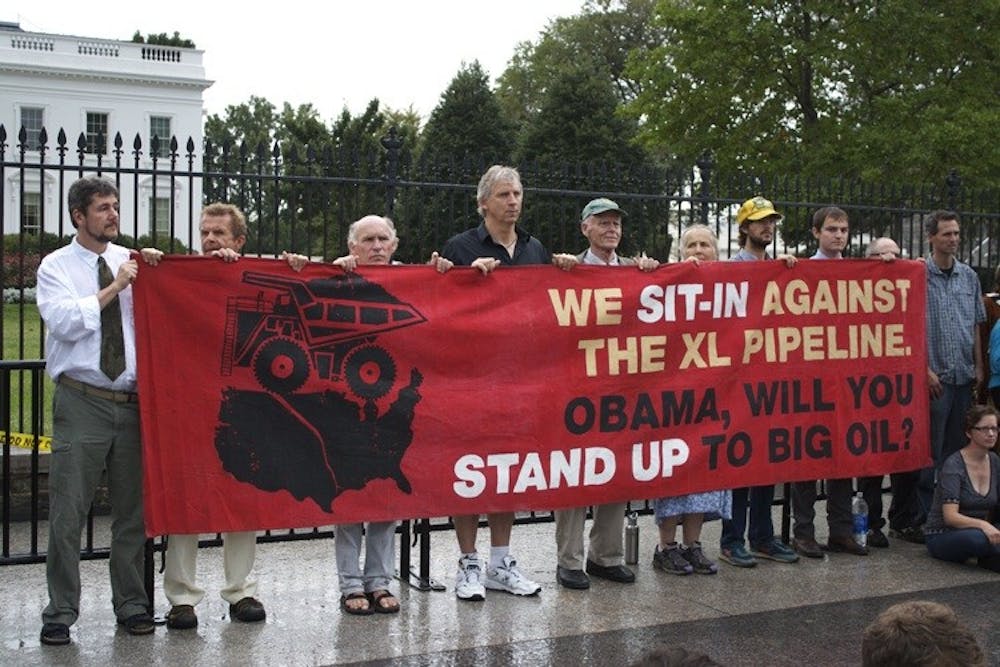AU Director of Sustainability Chris O’Brien and four other members of the American University community were arrested for civil disobedience Sept. 3. The five AU members were arrested outside the White House during a protest against a proposed pipeline that would bring tar sands oil from Canada to Texas.
Over 1,250 people were arrested over a two-week span while protesting the pipeline. On Saturday alone, 244 people were arrested — including five members of the AU community — according to tarsandsaction.org, one of the main websites used to coordinate the protest.
The police started arresting the 244 protesters who purposely sat in the sidewalk and street in front of the White House after giving three warnings to leave. They then began bringing activists to the Park Police Anacostia Station on the charge of “failure to obey a lawful order.”
Arrestees were then able to pay a $100 post-and-forfeit fine, which is not an admission of guilt or a conviction, and were released after only a few hours of jail time.
Tar sands: dirty fuel or steady oil supply?
Protesters argue that the proposed pipeline between Canada and Texas will be environmentally disastrous. They said the tar sands are the dirtiest source of fuel and that a leak could contaminate drinking water for 20 million people, according to the Wall Street Journal.
Tar sands are a mixture of clay, sand, water and a heavy black viscous oil that can be processed and refined into oil, according to the Oil Shale and Tar Sands Programmatic EIS Information Center.
TransCanada, the corporation hoping to build the pipeline, says it will provide jobs for Americans in a bad economy and produce a more steady supply of oil in a time of uncertainty over global sources, according to the Wall Street Journal.
O’Brien, professor and AU students arrested
O’Brien, Associate Professor Paul Wapner and a number of AU students were formally arrested for the first time on Saturday around 2 p.m.
“My job at AU is to fight climate change, so what better way to take your work home with you than to fight climate change on the weekend by protesting the tar sands pipeline?” O’Brien said.
When he was being arrested, O’Brien heard a cheer from both other arrestees and protesters in the legal zone, chanting “AU sustainability.” Once loaded onto the police “paddy wagon,” O’Brien found himself seated next to two AU students.
“It was certainly heartening to know that AU students are doing something about this issue,” he said.
Russel Warburton, a junior in the School of Public Affairs, was also arrested as part of the protest. Warburton attended to protest the longer prison sentences of the initial protesters, as well as to express his disapproval of the pipeline.
“The first day of this protest, they arrested everybody and held them for 48 hours, and it was unprecedented,” Warburton said.
“There was something about people just calmly walking into those Metro vans and into that police bus that I found almost beautiful,” Ian Hitchcock, a sophomore in the School of Communication, said, describing the police’s roundup of protesters. “I’m really honored to be a part of it.”
?Students weren’t the only people from AU present that day. Associate Professor Paul Wapner of the School of International Service was also arrested at the protest.
“I teach global environmental politics, and I feel like it’d be dishonest of me to teach it without being involved in these kinds of action,” he said.
In preparation for the possibility of being arrested, organizers held non-violence training sessions at two local churches the night before each day of protesting, as well as giving quick training sessions at the actual protest before protesters began committing civil disobedience that could land them in jail.
“I can’t thank and commend the police enough for the quality and the respect with which they treated us,” Hitchcock said.
AU students cheer on protestors
While some AU students were arrested on Saturday, even more came to cheer them on and to rally legally in Lafayette Park, across the street from the White House’s North Lawn. Thomas Meyer, a sophomore in the School of International Service who had been arrested on the previous Thursday, also came to protest — legally this time.
“We’re whispering in Obama’s left ear and the oil companies are screaming into his right ear, and we’re hoping that our whisper, with all of this [the two week protest], can turn into a scream,” Meyer said. “But the odds are against us.”
Protests also took place across the world at US embassies and consulates. As a part of this effort to fight the pipeline, the "Stop the Tar Sands” petition was presented to Obama with 618,428 signatures on Saturday, according to tarsandsaction.org.
The Obama Administration has said it will make its final decision on the pipeline by the end of the year, according to the New York Times. Activists plan to continue trying to stop the pipeline, according to the protest’s organizers.
As for the AU students involved in the protest, the arrests have not deterred them from taking a stand on the pipeline.
“I would do it again if I thought it was necessary,” Warburton said.
mzoglo@theeagleonline.com





